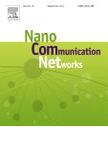版权所有:内蒙古大学图书馆 技术提供:维普资讯• 智图
内蒙古自治区呼和浩特市赛罕区大学西街235号 邮编: 010021

作者机构:Univ Warwick Sch Engn Coventry CV4 7AL W Midlands England Univ Warwick WMG Coventry CV4 7AL W Midlands England
出 版 物:《NANO COMMUNICATION NETWORKS》 (纳米通信网络)
年 卷 期:2016年第9卷
页 面:7-16页
核心收录:
学科分类:0810[工学-信息与通信工程] 0808[工学-电气工程] 08[工学] 0805[工学-材料科学与工程(可授工学、理学学位)] 081001[工学-通信与信息系统]
主 题:Molecular Communications Molecule concentration Decoding algorithm Bit Error Rate Capacity
摘 要:Molecular Communications (MC) is a promising paradigm to achieve message exchange between nano-machines. Due to the specific characteristics of MC systems, the channel noise and memory significantly influence the MC system performance. Aiming to mitigate the impact of these two factors, an adaptive decoding algorithm is proposed by optimising the symbol determination threshold. In this paper, this novel decoding scheme is deployed onto a concentration-based MC system with the transmitter emission process considered. To evaluate the performance, an information theoretical approach is developed to derive the Bit Error Rate (BER) and the channel capacity. Simulations are also carried out to verify the accuracy of these formulations, to compare the performance difference against other decoding schemes, and to illustrate the performance deviation caused by different designing of relevant parameters. Furthermore, the performance of MC systems with the distance unknown is also analysed. Comparisons between distance-pre-known and distance-unknown systems are provided. (C) 2016 Elsevier B.V. All rights reserved.